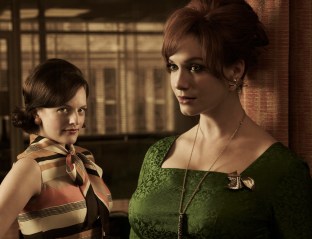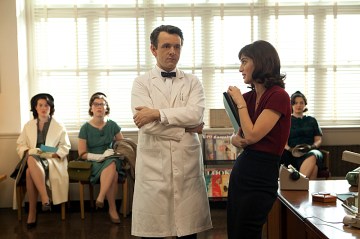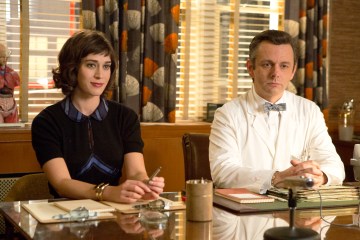Julianne Nicholson as Dr. Lillian Depaul and Lizzy Caplan as Virginia Johnson in Masters of Sex
Bloggers have been calling Masters of Sex — Showtime’s breakout drama about the pioneering research in the field of human sexuality conducted by William Masters and Virginia Johnson — a carnal Mad Men. But ignore the clinical couplings, and it’s clear the show explores some still-relevant feminist issues. Over the course of its first season, Masters has focused on what has been but a B -plot in Mad Men — Joan and Peggy sparring over whether flirting or seriousness is the best way to get ahead — and developed it into a full-fledged feminist crisis through the Virginia-Lillian rivalry.
For obvious reasons, comparisons betweenMasters of Sex and Mad Men are hard to avoid. They’re both character-driven period dramas. And they both begin with the same conceit: an ambitious woman applies to be the secretary for a powerful man who never cracks a smile and ascends the corporate ladder. This basic premise has led critics to compare Virginia (Lizzy Caplan) to Mad Men’s Peggy.
But the two share little in common. Virginia Johnson is the proud single mother of two kids; Peggy Olson denies her season-one pregnancy until the birth (and, for her, keeping the child is never even a possibility). Virginia unabashedly advocates sex for pleasure’s sake; the other secretaries call Peggy a prude. Virginia charms her way to the top; Peggy turns off her superior, clients and employees with her intensity.
In fact, it is Lillian who is the true Peggy of the gynecological ward in Masters advocating hard work over flirtation. Virginia takes on the role of Joan, the realist who knows how to leverage allure into advancement.
And the Virginia-Lillian relationship closely mirrors that of Joan and Peggy. The Mad women come into conflict in the very first episode, thanks to their polar-opposite approaches to succeeding in a sexist workplace. Joan flaunts her sexuality; Peggy imitates her male superiors. The men take notice. Paul tells Don that every girl is either a Jackie Kennedy or a Marilyn Monroe. “Well, Marilyn’s really a Joan, not the other way around,” he jokes as voluptuous Joan walks by. When Peggy asks who she is, the men reply “Gertrude Stein” and “Irene Dunn.”
Both the “male” and “female” work methods are successful in their own right: over the course of the show, Joan becomes a partner at the firm, and Peggy becomes one of the most important copywriters. But that doesn’t stop the two women from engaging in a bit of passive-aggressive verbal sparring.
JOAN:
I heard you were being considered for an account because a client’s
wife saw you and thought it would be okay if he worked with you.PEGGY:
You know, you’re no stick.JOAN:
And yet I never wonder what men think of me.
You are hiding a very attractive young girl under too much lunch.PEGGY:
I know what men think of you. That you’re looking for a husband.
And that you’re fun. And not in that order.JOAN:
Peggy, this isn’t China. There’s no money in virginity.PEGGY:
I’m not a virgin.JOAN:
No. Of course not.PEGGY:
I just realized something. You think you’re being helpful.JOAN:
Well I am trying, dear.
* * * * *
A less catty version of the same dynamic takes place between Virginia and Lillian in Masters. Lillian, resentful of patients mistakenly calling Virginia “Dr. Johnson,” complains to Bill Masters (Michael Sheen), “Mrs. Johnson hasn’t earned those credentials, and I take offense to a woman who uses her beauty and allure as a substitute for the knowledge and skill I sacrificed years to acquire.”
But for better or worse, Masters suggests that the Virginia/Joan method of charm was necessary to succeed and even advance in the 1950s workplace. As Lillian seeks out ways to raise money for her Pap smear program, Virginia offers her advice about her looks and attitude, telling her to let her hair down, put on makeup and flirt with the male doctors who control the fate of her project. Despite one failed flirtation attempt, Lillian does finally make progress on her project by charming the wives of the doctors—a strategy spearheaded by Virginia—and one Lillian (and any male doctor) would never have considered.
Lillian and Bill are very much alike — intimidating, smart, intense and lacking in personality — but it’s the female researcher who must beg the university for funding. What Lillian must learn from Virginia is the same lesson Bobbie Barrett tries to teach Peggy in Mad Men: “You can’t be a man. Be a woman. It’s a powerful business when done correctly.” Virginia’s struggle to sort out such questions is the main thrust of the drama of Masters of Sex.
Argue all you want that Peggy has emerged as the real protagonist of Mad Men, but it’s Don getting the most screen time and whose face is on the cover of the DVD box set. Lizzy Caplan as Virginia, on the other hand, is comfortably the co-lead—some may argue even the star—of Masters. And her modern-woman-trapped-in-the-’50s story, though it may stray from historical fact, is perfect for the lean-in, can-women-have-it-all? era of feminism.
The supporting female characters on the show, too, outdo their counterparts in Mad Men. Libby Masters (Caitlin FitzGerald) as the wife of the philandering leading man is a much more sympathetic and intriguing Betty. While the boss Roger Sterling’s wife and daughter drift in and out of seasons in Mad Men, Margaret (Allison Janney) and Vivian Scully bring those roles to life in Masters. And while secretaries tend to be the butt of jokes (or easily accessed mistresses) on Mad Men, Jane’s story gives us greater insight into their struggles. Throw in a lesbian prostitute, and Masters offers the largest and most compelling range of female characters since Orange Is the New Black — and does so without neglecting the men’s struggles as well.
I won’t champion the show as a feminist manifesto. The characters are products of their time. Virginia seems to have forgiven her on-again-off-again boyfriend Ethan for punching her in the first episode. The guy has somehow turned into a Boy Scout—an unimaginable feat for a character who hit a woman on a show set in present day.
But the final few episodes did a better job passing the Bechdel test than most dramas on television. (Granted, Virgina and Bill were separated for the first time the second-to-last episode this season, forcing her and Lillian to share screen time. And they do spend about half their road trip talking about penis envy. But that conversation, on the feminist scale, still beats Peggy and Joan finally bonding by gossiping about Don and Meghan’s engagement. Now that male-centric dramas like Mad Men, Breaking Bad and Dexter are coming to a close, and Masters has emerged as the most promising new show that aired this year, we’re hoping that television writers will start taking on the task of female drama.




